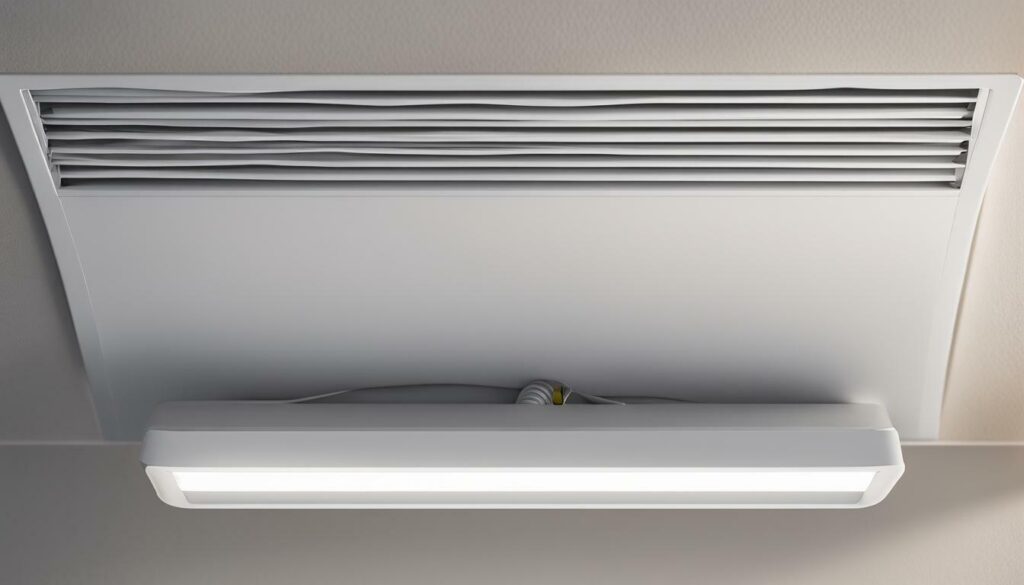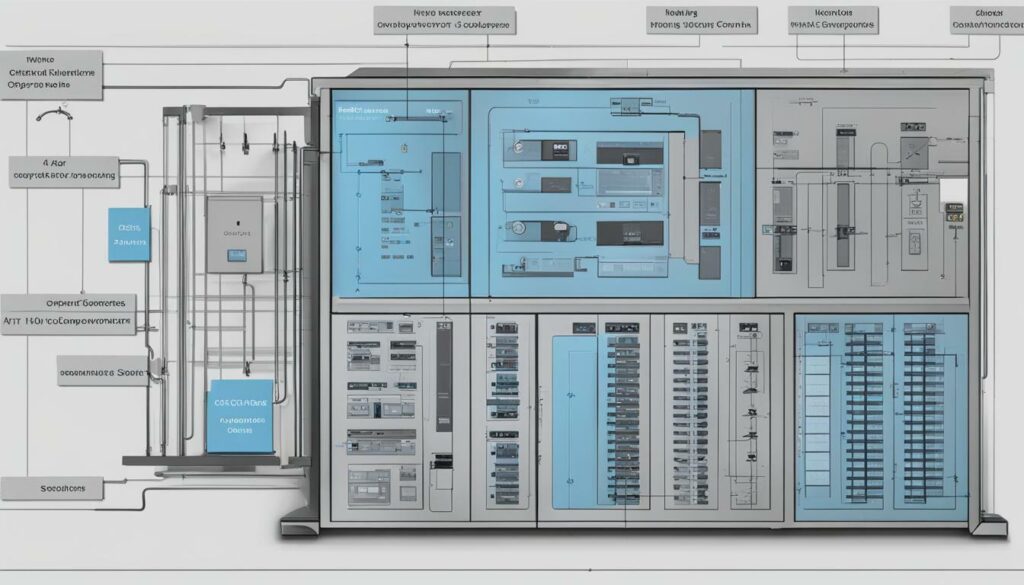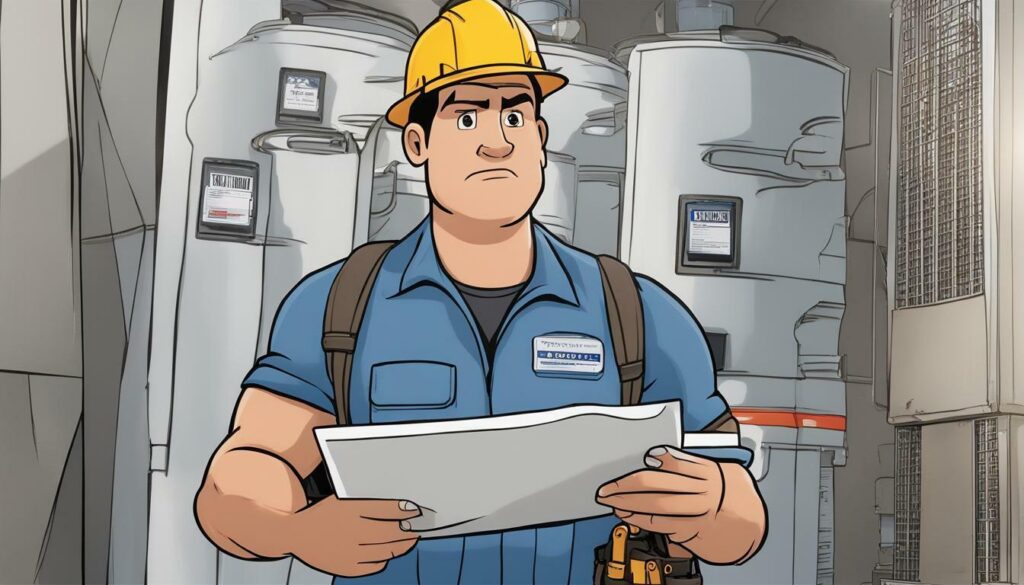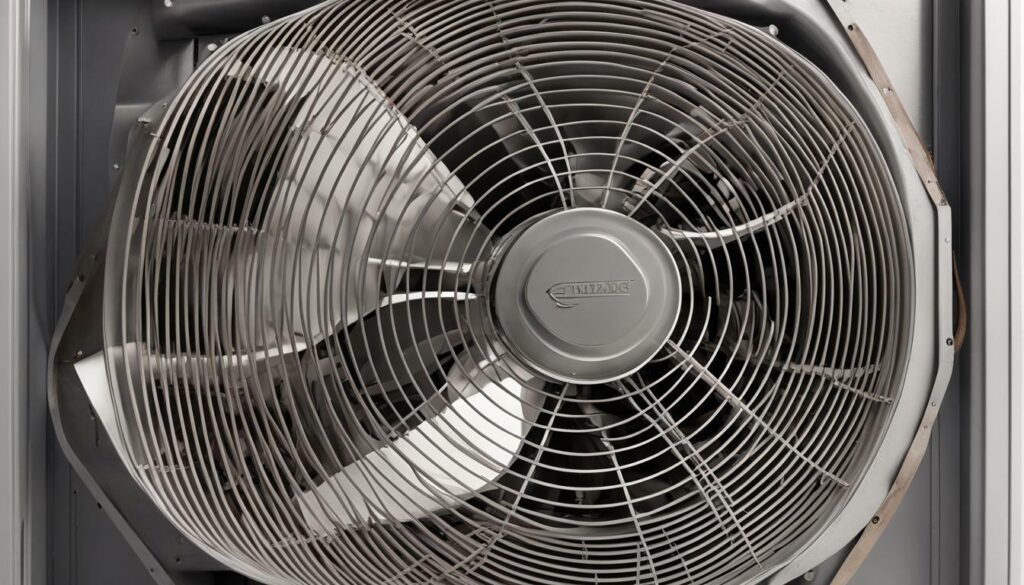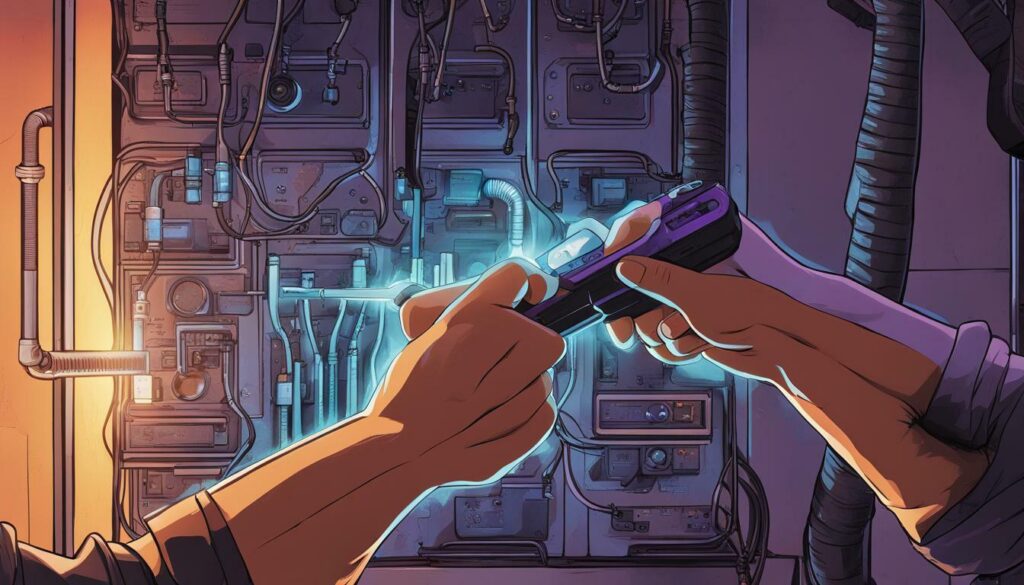Record keeping is an essential aspect of managing an HVAC business. Keeping accurate and up-to-date service records not only helps you stay compliant with legal and industry standards but also helps you optimize your operations and provide better service to your customers.
But how long must an HVAC servicing company keep records? The answer to that question is not straightforward and may differ depending on various factors such as the type of record and the applicable laws and regulations.
In this section, we will explore the recommended record retention period for HVAC servicing companies and the legal and industry standards for record retention. We will also provide insights on how to effectively manage and maintain service records for better compliance and operational performance.
Key Takeaways:
- Accurate and up-to-date record keeping is crucial for managing an HVAC business effectively.
- The recommended record retention period for HVAC servicing companies may vary depending on multiple factors, such as the type of record and legal regulations.
- Adhering to legal and industry standards for record retention and management can help ensure regulatory compliance and improve business efficiency.
The Importance of Record Keeping for HVAC Businesses
As an HVAC business, keeping accurate service records is essential for regulatory compliance and effective business management. Proper record keeping not only ensures compliance with legal requirements but also helps you provide better service to your customers and make informed business decisions.
To maintain HVAC service records, you should follow best practices for record management, which include organizing records by customer and service date, tracking equipment and repairs, and using standardized forms and templates. It is also important to ensure that all employees involved in record-keeping are properly trained and understand their role in the process.
Effective record management can help you better understand your business operations, predict future service needs, and improve customer satisfaction. By maintaining accurate and up-to-date records, you can track equipment performance, identify trends in service requests, and provide more personalized service to your customers.
To maintain proper record-keeping practices, consider implementing digital tools and software, such as customer relationship management (CRM) systems or automated service tracking tools. These tools help streamline record management processes and improve overall operational efficiency, allowing you to focus on providing the best service possible to your customers.
Overall, proper record-keeping is critical for HVAC businesses. By following best practices for record management and staying up-to-date with regulatory standards, you can not only remain compliant but also improve your business operations and provide exceptional service to your customers.
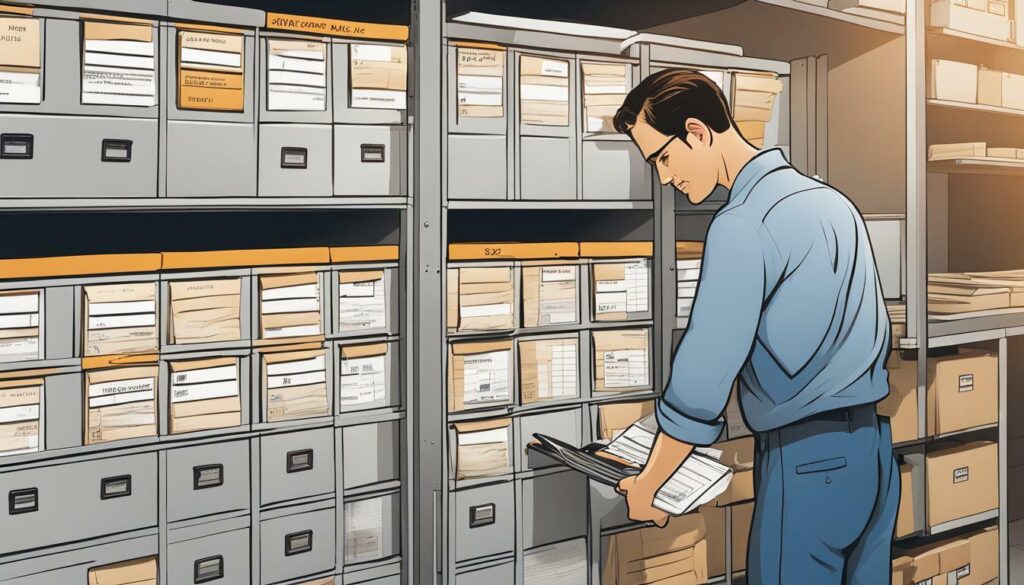

Legal Requirements for HVAC Service Record Maintenance
As an HVAC servicing company, you must comply with the legal requirements for record retention. These requirements ensure that your business keeps accurate records of all services provided, including repairs, maintenance, and installations.
One of the most critical legal requirements for HVAC service record maintenance is regulatory compliance. Regulatory agencies require companies to maintain service records to ensure that service providers are meeting industry standards and keeping customers safe. Failure to comply with regulatory standards can result in significant consequences, including fines and lawsuits.
Therefore, it is crucial to understand the regulatory compliance requirements set forth by relevant agencies and governing bodies. You must maintain detailed records of all services provided, including the date of service, the type of service provided, and the name of the technician who performed the service. Additionally, you must keep these records for a certain period to meet regulatory guidelines.
To avoid penalties and other consequences, make sure that your business stays up-to-date with the legal requirements for HVAC service record maintenance. Regularly reviewing and updating your record keeping practices can help you maintain regulatory compliance and avoid potentially costly mistakes.
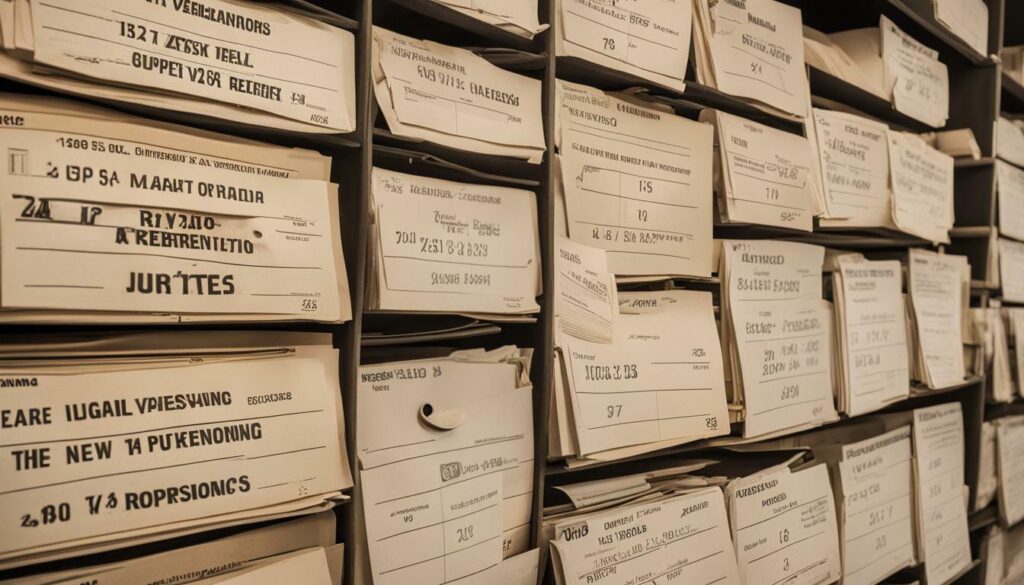

Industry Standards for HVAC Record Keeping
Effective record keeping is vital to the success of your HVAC business. Apart from meeting regulatory requirements, proper documentation helps you keep track of your business’s performance and identify growth opportunities. The HVAC industry has set record retention standards to guide businesses in maintaining accurate and up-to-date records.
The industry standards for HVAC record keeping primarily emphasize the importance of recording all service activities and information, including system installation, maintenance, and repair. Such information should be detailed, easy to access and protected from unauthorized access. The standards also recommend that HVAC companies keep financial records, including invoices, receipts, and client contracts, for an extended period of time.
Among the key industry associations and organizations that have provided record retention guidelines for HVAC companies are the Air Conditioning Contractors of America (ACCA) and the Sheet Metal and Air Conditioning Contractors National Association (SMACNA). The ACCA recommends that companies retain records of all servicing activities for a minimum of five years, while SMACNA recommends that businesses keep such records for at least seven years. It’s important to note that these are recommendations, and your local and state regulations may have different requirements.
| Industry Standards for HVAC Record Keeping | Record Retention Requirements for HVAC Companies |
|---|---|
| Record all HVAC service activities and information. | Retain financial records for an extended period of time, including invoices, receipts, and contracts. |
| Ensure that information is detailed and easy to access. | Retain service records for a minimum of five to seven years. |
| Protect data from unauthorized access. | Local and state regulations may have different requirements. |
Adhering to industry standards ensures that you maintain the highest level of professionalism and customer service. It also helps you stay compliant with regulatory standards and avoid legal issues that may arise from non-compliance. Additionally, it allows you to analyze your business data to establish effective marketing strategies, identify trends, and make informed decisions that drive profitability.
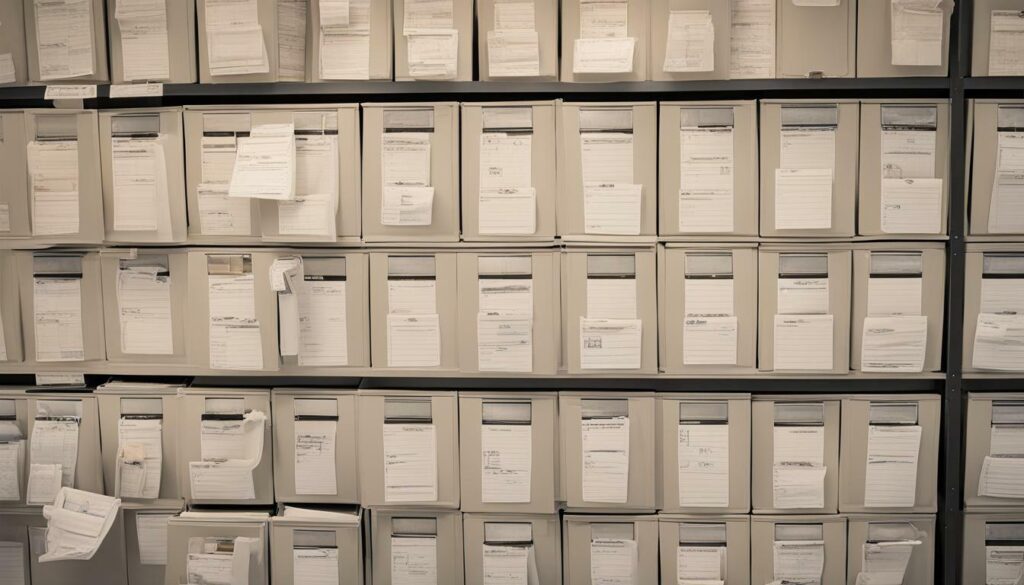

Recommended Record Retention Period for HVAC Servicing Companies
When it comes to record keeping for HVAC servicing companies, it is crucial to ensure that you retain service records for the appropriate length of time. The recommended record retention period for HVAC servicing companies can vary depending on the type of record and the specific regulatory requirements in your state or region.
Some common record retention periods for HVAC companies include:
- Contracts and agreements: Retain for at least seven years after the expiration date
- Invoices and billing records: Retain for at least seven years
- Inspection reports and maintenance records: Retain for at least two years
- Certificates of insurance: Retain for at least seven years
It is important to note that these are just general recommendations, and specific requirements may vary based on location and industry regulations. Your business should always consult with legal and regulatory experts to determine the appropriate record retention period for your specific situation.
It is also important to consider business needs when determining record retention periods. Keeping service records for longer than the minimum required period can provide important historical data for analysis and planning. However, keeping records for too long can also lead to clutter and increase the risk of data breaches or privacy violations. It is essential to strike a balance between compliance and business efficiency.
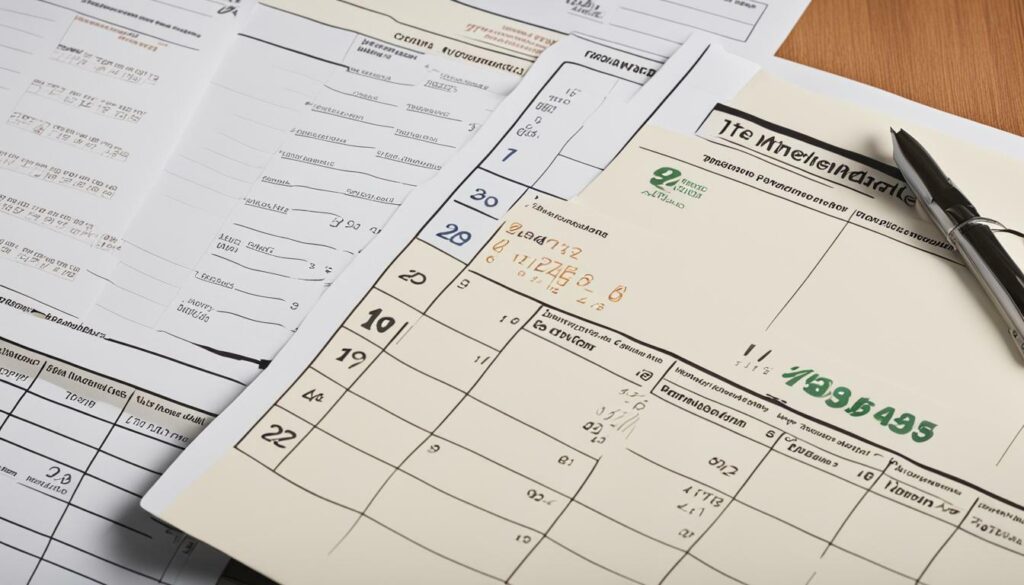

Overall, maintaining accurate and up-to-date service records is critical for HVAC servicing companies to ensure regulatory compliance and efficient business management. By observing the recommended record retention periods and implementing best practices for record management, your business can operate smoothly, meet compliance requirements, and provide excellent service to your customers.
Understanding Record Retention Guidelines
In the HVAC industry, proper record-keeping is essential to ensure compliance with regulations and to maintain efficient business operations. It’s important to know which records to keep and for how long, as well as the format in which they should be maintained.
The record retention requirements for HVAC companies may vary depending on the type of work performed, state and federal regulations, and industry best practices. However, the following guidelines apply to most HVAC servicing companies:
| Type of Record | Retention Period |
|---|---|
| Installation records | 5 years |
| Maintenance and repair records | 3 years |
| Equipment testing and inspection reports | 5 years |
| Refrigerant usage logs | 3 years |
HVAC companies should also keep copies of permits, licenses, and contracts for the duration of their validity, as well as any safety records, incident reports, and insurance policies.
It’s important to note that record keeping guidelines can change over time, so it’s essential to stay up-to-date with the latest regulations and industry standards. Make sure to consult with industry associations and legal experts to ensure your company’s compliance with all regulations.
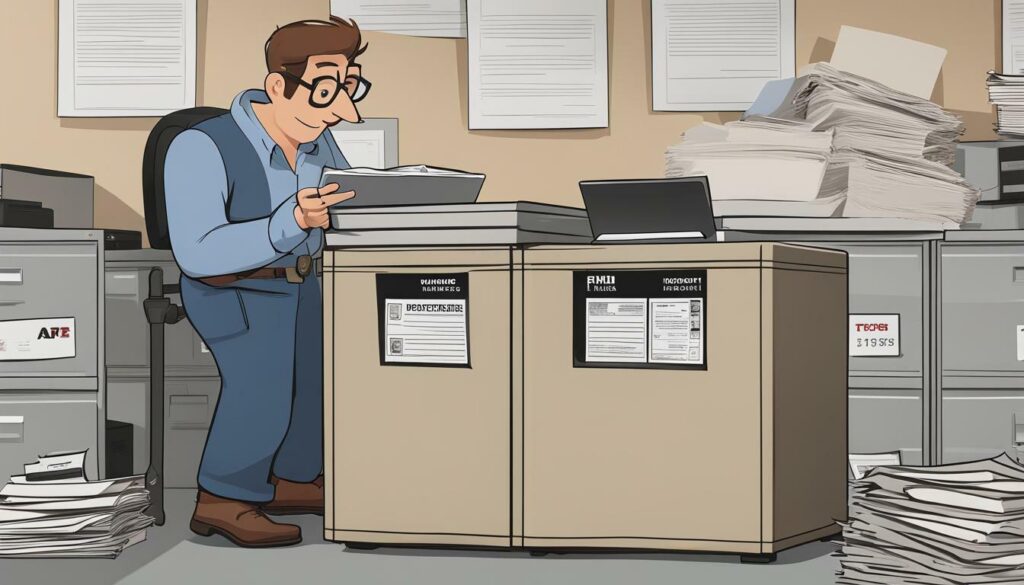

Effective record keeping requires attention to detail and a thorough understanding of the guidelines and regulations. HVAC servicing companies should follow the best practices for maintaining accurate and up-to-date service records, including:
- Using a standardized format for record keeping
- Having a dedicated record keeper or team responsible for maintaining records
- Keeping electronic and hard copies of records
- Regularly reviewing and updating records to ensure accuracy and completeness
- Developing a system for record retention and disposal
By following these guidelines and best practices, HVAC servicing companies can ensure legal compliance and efficient operations.
Balancing Regulatory Compliance and Business Efficiency
As an HVAC servicing company, you understand the importance of maintaining accurate service records to meet regulatory compliance. However, you also know that effective record keeping is essential to business efficiency and growth. Balancing these two priorities can be a challenge, but there are best practices you can implement to optimize both.
Firstly, it is important to establish clear processes and procedures for record keeping. This includes defining roles and responsibilities, ensuring proper training and education for employees, and setting up regular internal audits to monitor compliance. By having a structured approach, you can ensure that record keeping is not only compliant but also efficient and streamlined.
Another way to balance regulatory compliance and business efficiency is to leverage technology. Digital tools and software can help automate and streamline record-keeping processes, freeing up time and resources for other critical business operations. However, it is important to choose the right technologies and systems, and to ensure they are properly integrated with existing processes and procedures.
At the same time, it is important to maintain data security and confidentiality in record management. This involves implementing best practices for secure record storage and access, as well as ensuring that only authorized personnel have access to sensitive customer and business data. This not only protects the privacy of your customers but also keeps your business compliant with data privacy regulations.
By effectively balancing regulatory compliance and business efficiency in your record-keeping practices, you can ensure that your HVAC servicing company is not only compliant but also thriving and growing. With the right processes, technologies, and training, you can optimize your record-keeping practices to meet both regulatory requirements and business needs.
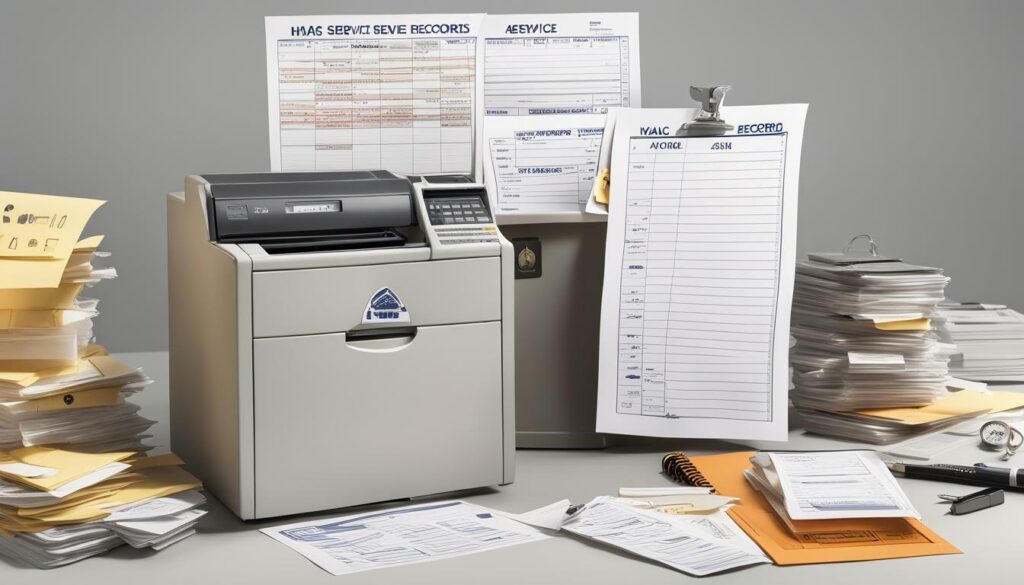

Ensuring Data Security and Confidentiality
As an HVAC servicing company, you handle sensitive customer and business information on a regular basis. Therefore, it is crucial to maintain the security and confidentiality of your service records. Failure to do so can result in legal and regulatory penalties and damage to your company’s reputation.
To ensure data security and confidentiality, it is essential to implement best practices for record management. These practices include:
- Controlling access: Access to service records should be limited to authorized personnel only. Restrict access to physical records by locking them in a secure location. For digital records, implement password protection and access controls.
- Secure storage: Service records must be stored in a secure location, free from threats such as theft, fire, and water damage. Consider cloud-based storage for digital records, which can provide additional security measures such as encryption and data backups.
- Secure disposal: When disposing of old or unnecessary records, ensure they are properly destroyed to prevent unauthorized access. Shredding physical records and permanently deleting digital records are two effective methods.
By implementing these best practices, you can maintain the integrity and privacy of your service records and protect your customers’ sensitive information.


Conclusion
Effective record management is crucial for the success of any HVAC servicing company. By following best practices for record retention and security, you can ensure regulatory compliance, optimize operational performance, and provide excellent service to your customers. In the next section, we will discuss how technology can be leveraged to improve record management efficiency.
Leveraging Technology for Efficient Record Management
With the increasing demand for digital solutions in the business world, HVAC servicing companies can greatly benefit from leveraging technology for record management. Digital tools and software can help automate and streamline record-keeping processes, saving time, and reducing errors. Here are some best practices for utilizing technology in HVAC record management:
- Invest in a reliable record-keeping system: Choose a system that fits your business needs and provides secure storage for records. This system should be easy to use and provide features such as automated reminders for record updates and data backups.
- Implement a digital tracking system: Use digital tracking for service calls, work orders, warranties, and other important documents. This way, records can be easily located and tracked, eliminating the risk of losing or misplacing important information.
- Ensure data security: Protect sensitive customer and business information by using secure storage and access controls. Use encryption technology to safeguard data and control who can access records.
- Train employees on how to use the system: Provide proper training to ensure all employees understand how to use the digital record-keeping system and follow best practices for data entry and storage. This will ensure consistency and accuracy in records and reduce errors and omissions.
By leveraging technology, HVAC servicing companies can improve record management efficiency and accuracy while providing secure and accessible record storage for regulatory compliance. Utilizing digital tools can also improve operational performance and customer service, helping your business thrive in a competitive market.
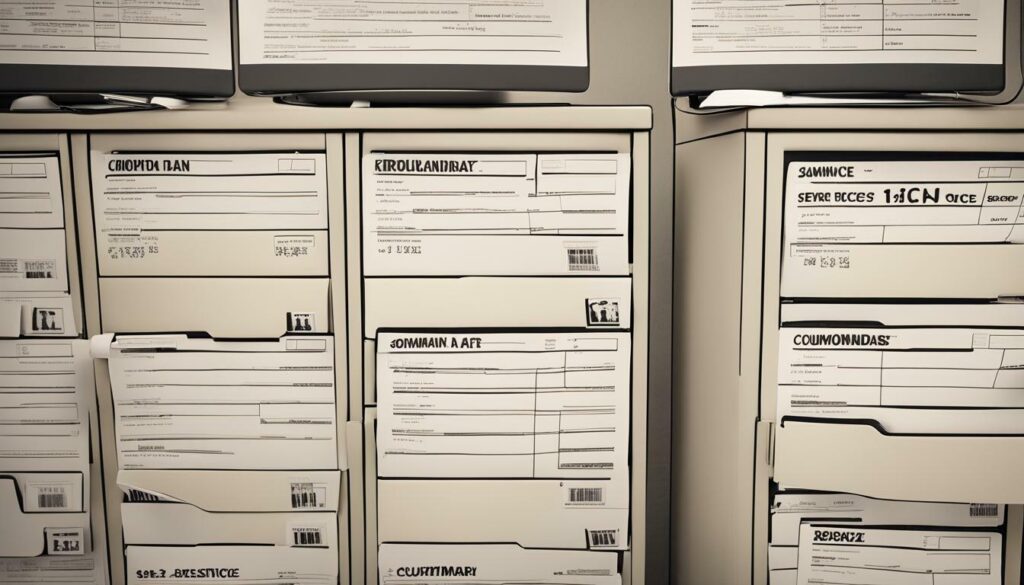

Auditing and Documenting Record Keeping Processes
Auditing and documenting your record-keeping processes is a crucial step in ensuring compliance and efficiency for your HVAC servicing business. Regularly auditing your record-keeping practices can identify areas of improvement, reduce errors in recordkeeping, and ensure that all necessary information is accurately reported.
Documenting your record-keeping processes helps to ensure consistency and provide a reference for future audits. It is important to maintain a written record of the procedures your business follows to maintain records, including the process for recording, storing, accessing, securing, and disposing of records.
When conducting an audit, it is important to review all aspects of your record-keeping, including the records themselves, the processes used to maintain them, and the personnel responsible for record-keeping. Auditing should be done on a regular basis to ensure that all guidelines and best practices are being followed.
By documenting your processes and conducting regular audits, you can maintain compliance with legal requirements, industry standards, and best practices for efficient record management.
Remember, effective record-keeping is a vital aspect of your HVAC servicing company’s operations, and it requires attention to detail and adherence to best practices. With the right processes in place, you can ensure your business runs smoothly and avoid any compliance issues or legal complications that may arise from inadequate record-keeping.
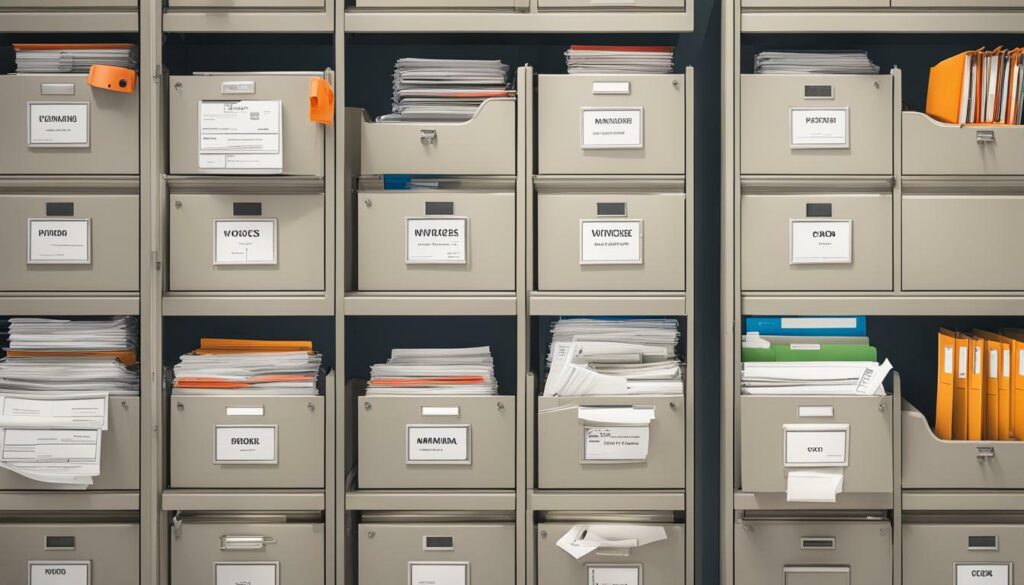

Training and Education for Effective Record Keeping
Now that you understand the importance of proper record keeping for your HVAC business, it’s time to focus on training and educating your employees on best practices. This is crucial to ensuring that everyone understands their role in record management and follows the proper procedures.
One of the best ways to achieve this is by developing comprehensive training programs that cover all aspects of record keeping, including what records to keep, how to maintain them, and how to document and audit your processes. These programs should be mandatory for all employees involved in record keeping and should be updated regularly to reflect any changes in regulatory requirements or industry standards.
Additionally, it’s important to provide ongoing education and resources to your team. This might include workshops, seminars, or access to online resources that cover best practices for HVAC service record management. By investing in your employees’ knowledge and skills, you’ll be better equipped to maintain accurate records and comply with industry regulations.
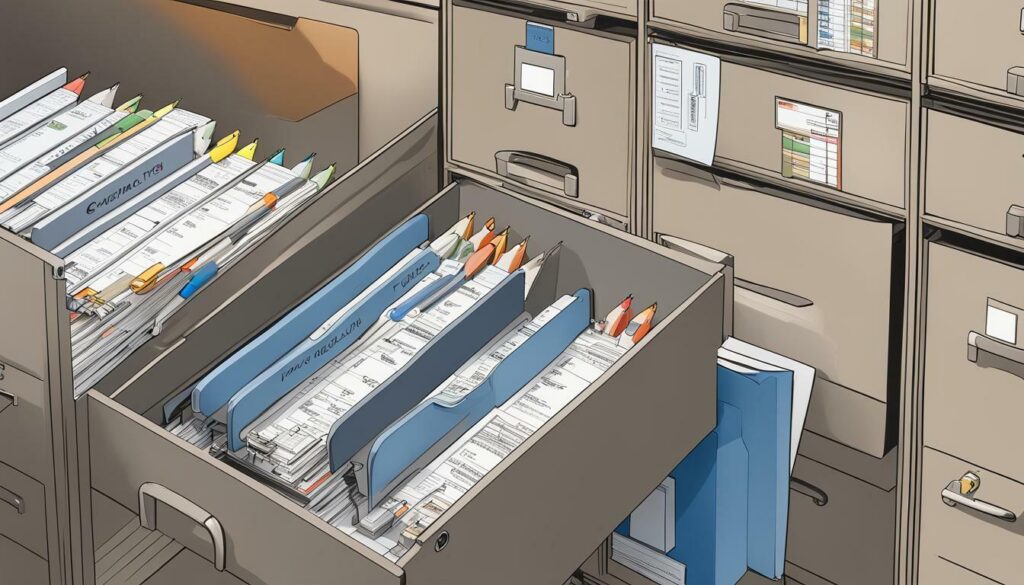

Remember, proper record keeping is not only a legal requirement, but it also helps you to run your business more efficiently. By training and educating your team on best practices, you can ensure that you’re maintaining accurate and up-to-date records while optimizing your operations.
In Conclusion
Proper record keeping is paramount for any HVAC servicing company. By adhering to legal requirements, industry standards, and best practices for record management, you can ensure compliance, streamline your operations, and provide top-notch service to your customers.
Remember to maintain accurate and up-to-date service records, implement secure storage solutions, and leverage technology to optimize efficiency. Conduct internal audits regularly, train your employees on record management best practices, and document your processes to ensure compliance.
By following these guidelines, you can effectively balance regulatory compliance with business efficiency, protecting sensitive information while also improving your bottom line. Keep these tips in mind, and you’ll be well on your way to becoming a record-keeping pro.
FAQ
Q: How long must an HVAC servicing company keep records?
A: The recommended record retention period for HVAC servicing companies varies depending on the type of record. However, as a general guideline, it is advisable to retain service records for a minimum of five years. This ensures compliance with legal requirements and allows for effective business management.
Q: What are the legal requirements for HVAC service record maintenance?
A: HVAC servicing companies must comply with various legal requirements when it comes to maintaining service records. These requirements may include retaining records for a specified period, ensuring data security and confidentiality, and following industry-specific guidelines. It is essential to stay informed about the specific regulations that apply to your jurisdiction to ensure compliance.
Q: What are the industry standards for HVAC record keeping?
A: Industry associations and organizations provide guidelines and recommendations for HVAC record keeping practices. These standards aim to ensure consistent and effective record management in the industry. By aligning your record keeping practices with industry standards, you can enhance operational efficiency and meet customer expectations.
Q: How can HVAC businesses balance regulatory compliance and business efficiency in record keeping?
A: Balancing regulatory compliance and business efficiency in record keeping can be achieved by implementing best practices. Streamlining record management processes, leveraging technology for efficient record keeping, and regularly auditing and documenting record keeping procedures are some strategies that can help HVAC businesses achieve this balance.
Q: How can HVAC servicing companies ensure data security and confidentiality in record management?
A: It is crucial for HVAC servicing companies to prioritize data security and confidentiality in record management. Best practices include securely storing physical and digital records, limiting access to sensitive information, and implementing proper data protection measures. By maintaining the integrity and privacy of customer and business data, HVAC businesses can build trust with their clients.
Q: How can technology be leveraged for efficient record management in HVAC companies?
A: Technology plays a vital role in efficient record management for HVAC servicing companies. Utilizing digital tools and software can streamline record-keeping processes, improve accessibility, and enhance overall operational efficiency. These technological solutions can help HVAC businesses save time and resources while maintaining accurate and up-to-date records.
Q: What role does training and education play in effective record keeping for HVAC companies?
A: Training and education are essential for employees involved in record keeping within HVAC companies. Providing comprehensive training programs ensures employees understand their responsibilities and follow best practices in record management. By investing in training and education, HVAC businesses can maintain high-quality record keeping and minimize errors or discrepancies.


